Related Research Articles

The Kikuyu are a Bantu ethnic group native to East Africa Central Kenya. At a population of 8,148,668 as of 2019, they account for 17.13% of the total population of Kenya, making them Kenya's largest ethnic group.
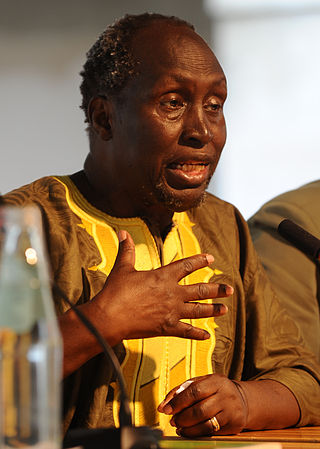
Ngũgĩ wa Thiong'o is a Kenyan author and academic, who has been described as "East Africa's leading novelist". He began writing in English, switching to write primarily in Gikuyu. His work includes novels, plays, short stories, and essays, ranging from literary and social criticism to children's literature. He is the founder and editor of the Gikuyu-language journal Mũtĩiri. His short story The Upright Revolution: Or Why Humans Walk Upright has been translated into 100 languages.
Meja Mwangi is a Kenyan writer. He has worked in the film industry, including in screenwriting, assistant directing, and casting.
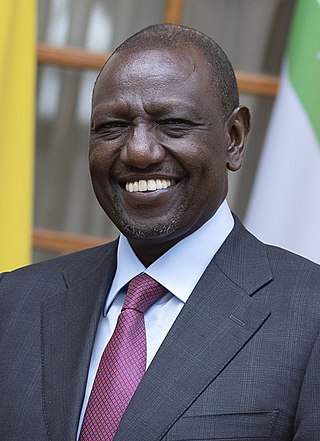
William Kipchirchir Samoei Arap Ruto is a Kenyan politician who is the fifth and current president of Kenya since 13 September 2022. Prior to becoming president, he served as the first elected deputy president of Kenya from 2013 to 2022. Previously, holders of the position were referred to as Vice President and the officeholder was unelected and appointed by the President. He previously served in three cabinet portfolios as the Minister for Home Affairs, the Minister of Agriculture and as Minister for Higher Education.

The In-Between World of Vikram Lall is a novel by M. G. Vassanji, published in 2003 by Doubleday Canada. The novel won the Scotiabank Giller Prize that year and narrates a story of Vikram Lall in the colonial and post-colonial Kenya. The title for the novel also inspired the title for Elizabeth Nunez's novel Anna In-Between, published in 2009.
Festus Iyayi was a Nigerian leftist writer, best known for advancing his politics through realist novels depicting the sociopolitical environment of contemporary Nigeria. He was also a former president of the Academic Staff Union of Universities (ASUU). He died in a road accident on his way to Kano.
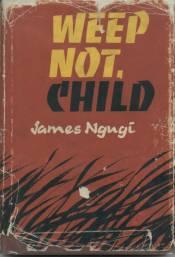
Weep Not, Child is a 1964 novel by Kenyan author Ngũgĩ wa Thiong'o. It was his first novel, published in 1964 under the name James Ngugi. It was in the African Writers Series of the Heinemann publishing company. Weep Not, Child was the first English-language novel by an East African to be published. Thiong'o's works deal with the relationship between Africans and white settlers in colonial Kenya, and are heavily critical of colonial rule. Specifically, Weep Not, Child deals with the Mau Mau Uprising, and "the bewildering dispossession of an entire people from their ancestral land." Ngũgĩ wrote the novel while he was a student at Makerere University.

Joe was a magazine published in Kenya between 1973 and 1979, at the height of what publisher Henry Chakava described as the "fat years" of Kenyan publishing. Joe was one of several publications aimed at the new urban middle and lower-middle classes, and used subversive humour, art and fiction as a medium for cultural, social and political analysis. The magazine also provided a platform for new artists and fiction writers.

Petals of Blood is a novel written by Ngũgĩ wa Thiong'o and first published in 1977. Set in Kenya just after independence, the story follows four characters – Munira, Abdulla, Wanja, and Karega – whose lives are intertwined due to the Mau Mau rebellion. In order to escape city life, each retreats to the small, pastoral village of Ilmorog. As the novel progresses, the characters deal with the repercussions of the Mau Mau rebellion as well as with a new, rapidly westernizing Kenya.
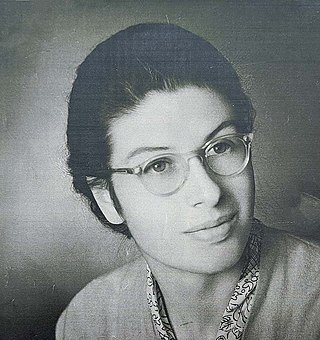
Marjorie Phyllis Oludhe Macgoye was born in Southampton, England, but immigrated to Kenya soon after Kenya became independent. She was a poet, novelist, and a missionary bookseller. She studied at the University of London for both her bachelor and master's degree. In 1954, she moved to Kenya to sell books and, while there, she met Daniel Oludhe Macgoye, a medical doctor, and they were married in 1960. She became a Kenyan citizen in 1964.
The Text Book Centre Jomo Kenyatta Prize for Literature is a biennial literary award given by the Kenya Publishers' Association. It has been called "the most prestigious literary award in the country".
Son of Woman is a Postcolonial Kenyan crime fiction novel by Charles Mangua, which was first published in 1971 in Nairobi, Kenya. In a country struggling to reclaim identity, Mangua creates a character that is "returning to a homeland….using an available asset to begin a new career;" a character and story that resonates with the larger population.
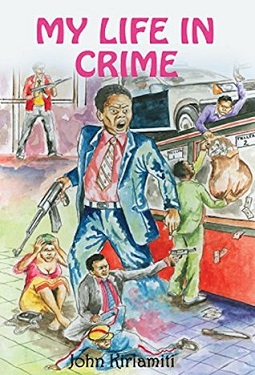
My Life in Crime is a 1984 novel by Kenyan author John Kiriamiti. It is a fictionalized account of Kiriamiti's criminality in Kenya during the 1960s and 1970s. The novel details Kiriamiti's crimes under the alias Jack Zollo that led to his imprisonment. It is the first novel in Kiriamiti's My Life... trilogy, which is currently being made into a film.
Kenyan crime fiction is a genre of crime fiction that is set in the country of Kenya, and usually written by Kenyan authors. According to G.J. Demko of Dartmouth College, "The fundamental premise of all [crime fiction] is a society that is ordered and real but becomes disordered as a result of a crime imposed on that society. In the normal case, a hero arrives - an officer of the law, a private detective or an amateur sleuth - and via logical deduction, hard work or luck, solves the crime, identifies the perpetrator, and order is restored." However, Kenyan crime fiction differs slightly from Demko's definition because of the following reasons: crime is often so pervasive in societies portrayed in Kenyan crime novels that it becomes almost a part of the order, and many times crimes are not conclusively solved by the end of the stories, mimicking the real-life cyclical nature of crime.
Terry Hirst (1932–2015), was a British-Kenyan cartoonist and one of the leading figures in Africa's post-independence "golden age" of art and scholarship from the mid-1960s to the early 1980s which saw a flowering of work in the arts, cinema and the academic world. Terry Hirst was born in 1932 in Brighton in England. In 1965, Hirst moved to Kenya where he was to spend the rest of his life.
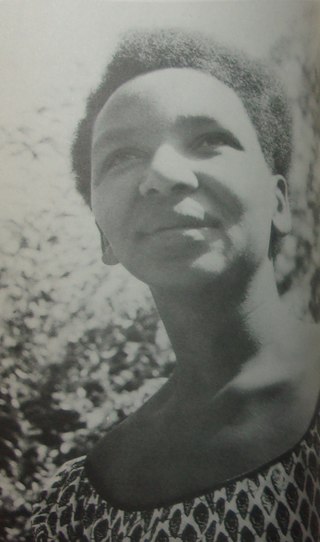
Rebeka Njau was Kenya's first female playwright and a pioneer in the representation of African women in literature. Her writing has addressed topics such as female genital mutilation and homosexuality. Her first novel, Ripples in the Pool (1975), appeared as number 203 in the Heinemann African Writers Series.

Sumu la Penzi is a Kenyan Swahili, melodrama that premiered in 2013 in Africa Magic Swahili. It has Serah Ndanu, Joyce Maina, Naomi Ng'ang'a and Judith Nyambura as the female leads.
The Future Leaders is a 1973 novel by Kenyan novelist Mwangi Ruheni. It was published as part of the important African Writers Series. The novel is set in Kenya before its independence from Britain, following the life events of Reuben Ruoro during the transition from colony to independent country.

The Mzungu Boy is a novel by Meja Mwangi. It is set in Kenya during the 1950s; during that time, the country was under British rule. The British colony is facing a Kenyan uprising known as the Mau Mau Rebellion. The majority of the fertile farmland is under British control, and the best the Kenyans can hope for is to work the land as tenant farmers, giving the majority of their yield to the British. While the Kenyans work the land, they live under oppressive conditions and under constant threat of violence. The Mau Mau rebellion seeks to rid the land of the British colonizers and give the country back to Kenyans.
Nici Nelson is an Africanist, social anthropologist and a Honorary Research Fellow in the Department of Anthropology at Goldsmiths, University of London. She obtained a PhD on Kikuyu women in Nairobi, Kenya, from the University of London in 1978 and has published on various fields such as urban anthropology, gender and sexuality, and marriage and households in East Africa. Nelson was President of the African Studies Association of the United Kingdom (ASAUK) in the years 2002-2004 and was one of the recipients of the ASAUK Outstanding African Studies Award in 2015-2016.
References
- ↑ Nelson, Nici (1992). "Representations of Men and Women, City and Town in Kenyan Novels of the 1970s and 1980s". African Languages and Cultures. 9 (2): 145–168. doi:10.1080/09544169608717807.
- ↑ Kehinde, Ayo (2004). "POST-INDEPENDENCE DISILLUSIONMENT IN CONTEMPORARY AFRICAN FICTION: THE EXAMPLE OF MEJA MWANGI'S KILL ME QUICK". Nordic Journal of African Studies. 13 (2): 228–241.
- ↑ Elder, Arlene (1991). "In Pursuit of the "Kenyan Dream": Mwangi Ruheni's the Future Leaders and Meja Mwangi's Kill Me Quick". World Literature Written in English. 31 (2).
- ↑ Smiley, Sarah (2009). "Teaching Africa's Cities Through Meja Mwangi's Novels". Journal of Geography. 108 (4).